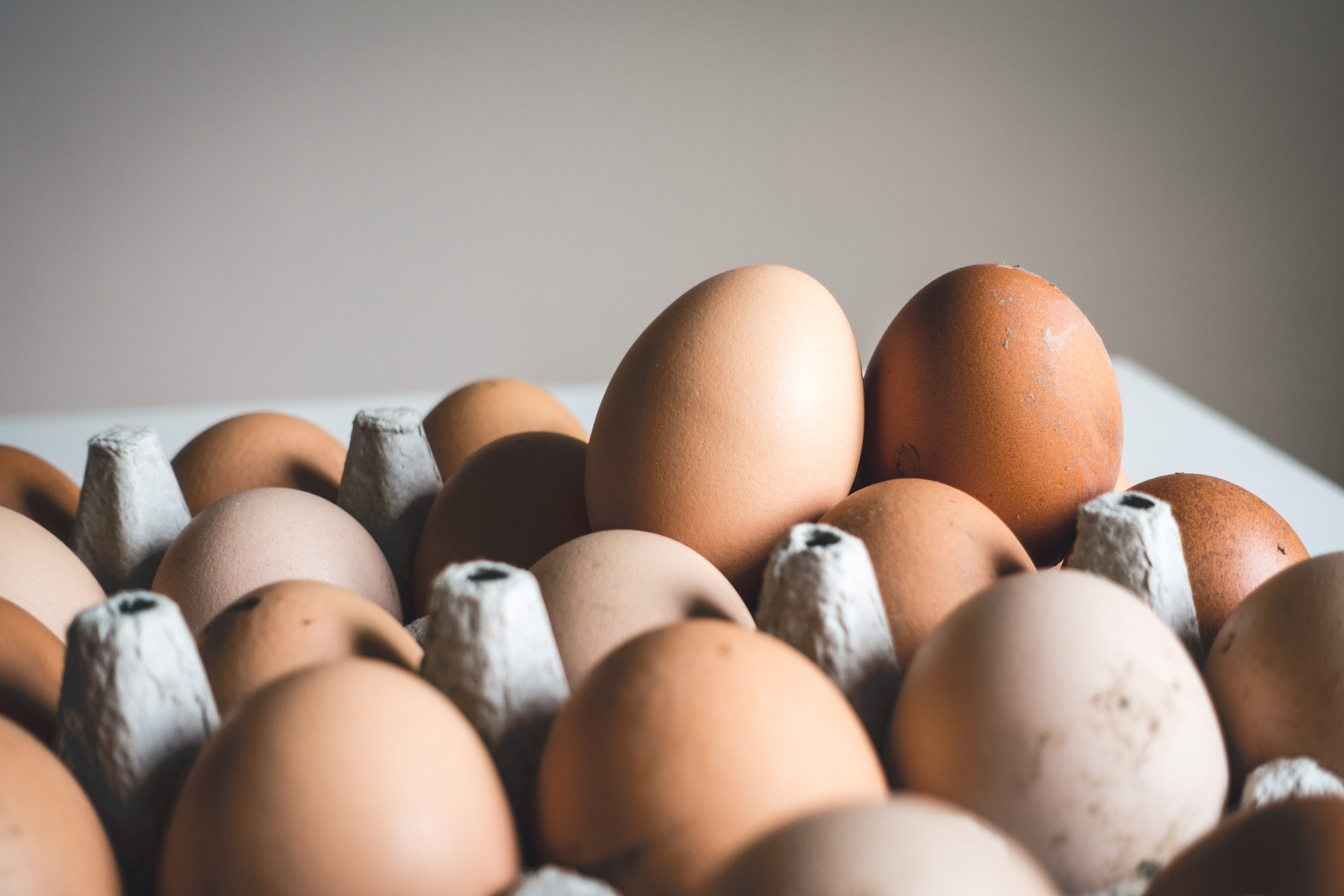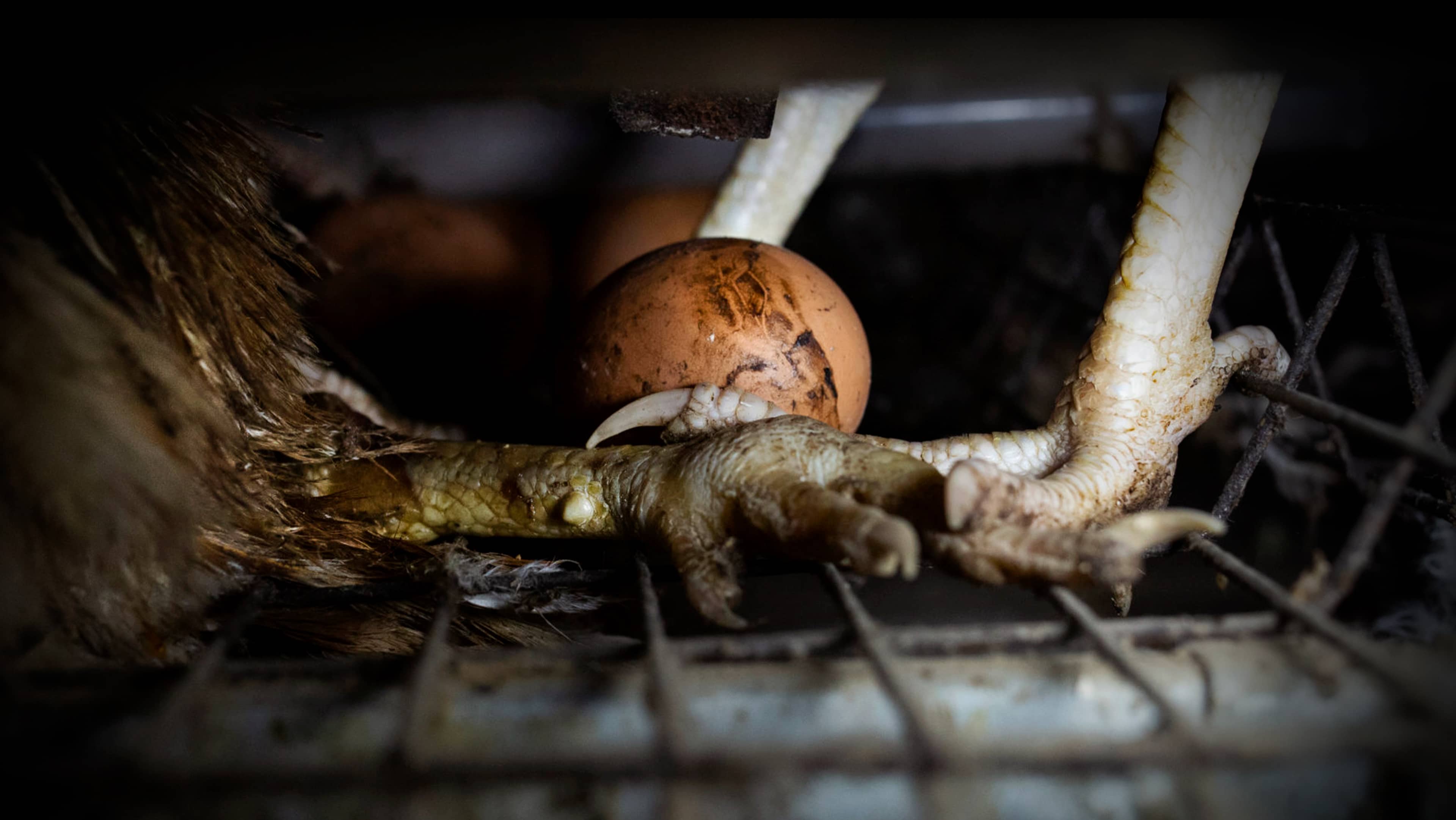




Why eating eggs is bad for health – and bad for chickens, too

You may be asking yourself, what’s wrong with eggs? While it is true that hens naturally lay eggs, the egg industry is responsible for horrendous suffering. On top of that, numerous studies have revealed cause for great concern when it comes to the bad health implications of consuming eggs.
Why should we not eat eggs?
Eggs are considered a breakfast staple in kitchens around the country, but that doesn’t mean we should be eating them. In fact, there are a number of ethical and health reasons why we should think twice before serving up chicken eggs.
Chicken farming conditions
Despite the ban on barren battery cages that went into effect in 2012, life for laying hens - those who lay the eggs we eat - remains bleak. Now, instead of being crammed into a barren environment without enough space to express their natural behaviours, hens are confined to ‘enriched’ cages with a nesting area, perches, litter and slightly more space - though still not enough to express natural behaviours like fully spreading their wings.
Debeaking of chicks
Beak trimming is done to prevent an unfortunate side effect of factory farms: cannibalism. Chickens can be driven to cannibalism from frustration at not being able to forage.
In order to curb the unwanted behaviour, up to half of birds’ beaks are removed when they are just a few days old. The procedure often results in acute pain and a reduction in how much they eat.
Disposal of male chicks
Male chicks are viewed as nothing more than a byproduct of the industry. They can’t lay eggs, and they won’t grow fast enough to make a profit as meat.
Unfortunately, the UK has yet to enact legislation that would require the use of technology to identify male chicks before they hatch. Instead, male chicks are gassed to death.
Slaughter of hens
After only a little more than a year, the number of eggs a hen lays drops, and at that point the whole flock will be sent to slaughter.
Poor working conditions
Factory farms are well known for their use of immigrant labour in order to cut costs. The British egg industry is no exception. One case that previously made headlines involved bedbug ridden housing and an extreme lack of food.
Health risks to the public
Egg farms, like other factory farms, act as hotbeds for the transmission of zoonotic disease. Of particular concern is bird flu, which has been spreading like wildfire across farms and has even made the jump to people.
Antibiotic use
Antibiotic resistance is a real concern for medical professionals, which means it’s a real concern for all of us. Despite the increasing threat of antibiotic-resistant bacteria, farms everywhere continue to give a massive amount of antibiotics to animals in order to prevent them from developing disease.
Environmental impact
Large-scale chicken farming is also to blame for vast amounts of water and air pollution.
Little is being done to stop pollution. A recent investigation found that a legal loophole in England allows farmers to pollute waters by spreading excess manure onto the land. Both the British Egg Industry Council and British Poultry Council were present at meetings that solidified the loophole.
Health Risks of Eating Eggs
Eggs are not innocent on the health front either. Overconsumption can lead to severe and lifelong health conditions, while eating a single egg could land you with a nasty case of food poisoning.
Cholesterol
Eggs and their potential role in a healthy diet has been the subject of much debate. Some research has suggested that overconsumption of eggs places you at an increased risk of developing conditions like high cholesterol and heart disease.
Consumers in the UK should be especially careful; due to their larger size, a single large egg has 235 mg of cholesterol compared to 186 mg in the United States.
Heart Disease
A study carried out by researchers at Northwestern University in the United States found that for each extra half-egg participants consumed per day, their risk of developing heart disease went up by a whopping 8%. While these findings are correlational (they note a relationship but can’t prove that one factor is causing the other) the findings are still striking.
Diabetes
Several studies have linked eating eggs with diabetes. One such study evaluated data from 8,000 Chinese participants and found that those who ate the highest number of eggs were also at the greatest risk of diabetes.
Cancer
Eating even one egg a day has been linked to an increased risk of developing numerous kinds of cancer.
Egg consumption is associated with a significant increase in breast cancer risk once women get up to around five eggs a week.
~ Dr. Michael Greger.
Men aren’t off the hook either: eating three or more eggs a week has been linked to a risk increase “as high as 71 percent” for developing colorectal cancer.
Food Poisoning
Within the egg supply chain, there are numerous touchpoints where salmonella contamination can occur. While caged birds are at heightened risk of having the bacteria, it can also be spread due to everything from pests to transport trays.
Salmonella causes food poisoning. Rarely lethal, most people with food poisoning endure symptoms for less than a week. However, symptoms are extremely uncomfortable and include diarrhoea, vomiting, nausea, cramping, and fever.
Is it bad to eat eggs every day?
There are numerous reasons why you should avoid eating eggs every single day. On a personal level, doing so has been linked to numerous health concerns, including the development of several kinds of cancer.
Aside from personal health, consuming eggs - especially those laid by hens on factory farms - places society at a greater risk of another pandemic. Crowded farms foster conditions where zoonotic disease can thrive.
Consuming eggs also perpetuates vast amounts of animal suffering in the form of debeaking, male chick culling, and lives filled with suffering for animals spent in small cages.
Is eating eggs cruel to chickens?
Purchasing eggs and egg products directly supports an industry that causes a lot of suffering to chickens. Every egg eaten is the equivalent to at least a whole day of suffering for a factory farmed chicken.
Are chickens treated better when the eggs have the Red Lion Stamp?
The Red Lion Stamp, or British Lion Mark, was introduced in 1998 to reduce the risk of salmonella caused by eggs. It has been hugely influential in practically eradicating salmonella in the UK, but unfortunately has limited impact on the health and welfare of the chickens producing eggs.
Chickens are not very intelligent, so why should I care?
It is a very common misconception that chickens are stupid. But there have been multiple studies demonstrating that chickens are not so ‘bird-brained’ as you may think. They have demonstrated the ability to count, show foresight, and can recognise over 100 individual faces and build close bonds.
Check out our 10 facts about chickens you may not know.
Is buying British eggs good?
The UK does have better legislation around welfare than many other countries outside the EU, and farms are not allowed to use barren cages. However, hens still suffer throughout their short lives. They are laying over 25 times what they naturally would be, their bodies abused for the eggs that we consume, and their lives are cut short when the industry has no further use for them.
And it’s not just the hens who suffer. Millions of male chicks are killed within just 72 hours of being born, their lives treated as worthless because they cannot lay eggs and are not profitable to raise for meat.
Whenever we use an animal for food, and especially when profits are put above welfare, we are causing an animal to suffer.
What are we doing?
On many factory farms, the methods with which chickens are raised and slaughtered causes unimaginable and unneccessary pain and distress. But there is something we can do. At The Humane League UK, we’re fighting for change to bring an end to the most extreme suffering.
We’re persuading companies to improve their welfare practices and collaborating with other animal welfare groups to achieve legislation protecting farmed animals.
We at The Humane League UK know that each step takes us closer to our vision of a world when animals are not abused for food.
Want to make a difference for animals? Join thousands of others and start by signing the petition below, it'll only take a moment.








